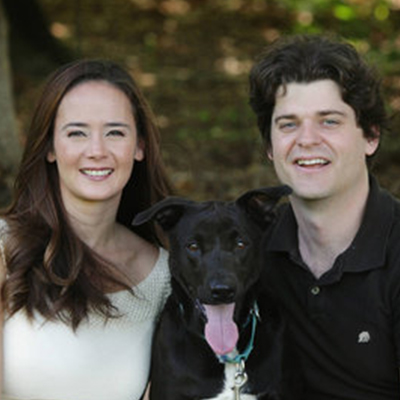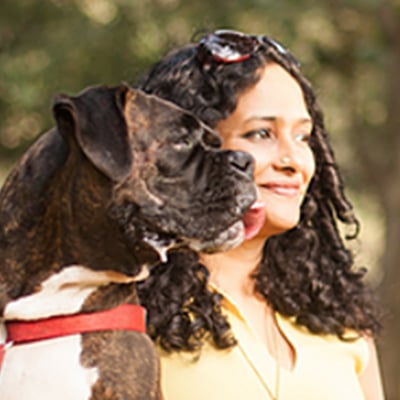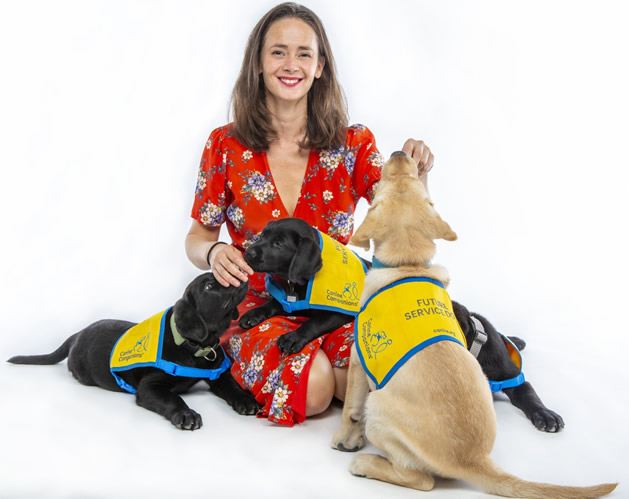Dog Behavior Conference
Conference begins in:
Day(s)
:
Hour(s)
:
Minute(s)
:
Second(s)
How Attendees Describe the DBC Experience:

The Ultimate Dog Geek Event of the Year
As in past years, in 2026 the thirteenth annual DBC will once again be accessible to all as a global online event.

Expand your knowledge, re-charge your passion, connect with like-minded dog people, learn how science impacts real-world training, and renew your dedication and inspiration to helping provide the best possible life for dogs and the people who love them.
Attendees of the 3-day online event will receive full entry to stream all of its live presentations, downloadable PDF resources, exclusive access to special promotions, and access to video recordings of each presentation from the conference.
Seats are limited, so don’t delay in registering for the online conference now to ensure you have a spot at this industry-leading annual event!
$189 (~£139) for all 3 days
2026 DBC Presentations

Kay Attwood
Certified dog trainer and owner of K9 Services
Canine Cognitive Skills
As a species, dogs have relied on their brains in order to survive and to adapt, evolving from their wolf ancestors to become the highly successful domesticated dog we know today. They have learnt what they want and need in order to survive, and they have also learnt what to avoid in order to stay safe. These are self-taught lessons, using knowledge accrued from experience and then passing it on to others within their family group or social group, over years of evolution.
We know that dogs can process information, make decisions and problem-solve. They have the cognitive skills, but for many individuals they remain dormant. The domesticated dog no longer needs to use his wits in order to survive. We provide food, shelter and safety, so surely our dogs are perfectly happy jogging along, relying on us to make all the decisions?
Obviously, we cannot quantify what makes our dogs happy or content but imagine what it would be like living in a black-and white world, with little or no stimulation, and no opportunity for growth and development. It would be akin to sleepwalking through life rather than living it. Let us start by looking at the benefits of developing a dog’s cognitive skills. On a simple level, it will:
- Give young dogs a chance to use their developing brains.
- Provide mental stimulation for dogs of all ages to keep their minds active.
- Allow opportunities for enrichment.
- Provide a low impact activity for older dogs, or those recovering from illness or surgery.
- Allow dogs and guardians to spend quality time together, thus enhancing the bond between them.
On a deeper level, it can be the means of:
- Improving cognitive abilities – including memory, decision-making and problem solving – which can be highly beneficial in sporting/competitive situations.
- Acquiring focus and ignoring distractions – useful in everyday life, and key to success in challenging competition environments.
- Decreasing anxieties and restoring peace of mind.
- Keeping dementia at bay.
- Changing behaviour

Irith Bloom
Certified VSPDT trainer, animal behavior expert, founder of The Sophisticated Dog and Carefree Companion, VSA Faculty
Habituation: A useful, yet often forgotten, type of learning
Did you know that there are types of learning other than operant and classical conditioning? One of the other types of learning is non-associative learning, which includes habituation and sensitization. Sensitization is not something most animal trainers want to encourage, but habituation is a great tool that often gets forgotten or ignored – in part because it can be a challenge to figure out how to harness it.
In this session, Irith will present a habituation exercise that helps animals – including anxious and overreactive animals – learn to cope better with life. It’s called “Watching the World Go By.” Watching the World Go By (WTWGB) is a deceptively simple technique that has benefits well beyond its obvious immediate goals. In fact, clients and students who use WTWGB often see improvement in areas they have struggled with for years. Want to learn more? Join Irith for this fun, slightly geeky, and very practical presentation!

Adam Daines
Certified VSPDT dog trainer, VSA Faculty Advisor, and owner of Avon Dog Services
Shaping the Reactive Dog
Shaping is one of the most versatile concepts in dog training, allowing complex behaviours to be sliced down into smaller, more manageable chunks, but when it comes to reactive dogs, shaping opens up a whole new world!
In this presentation we explore the world of shaping, ways to make shaping easy to understand even for newcomers to dog training, as well as exploring the importance of shaping with reactive dogs.

Kamal Fernandez
Dog trainer, author, and world championship level sports dog coach
Multi Dog Mayhem: When more isn’t always better
If you are an avid dog lover and enthusiast, the idea of having a multi dog household can be the thing of dreams.. all the dogs hanging out, sleeping on your bed, group walks and more furry faces to adore…but can often become a living nightmare, when there is a fall out or tension!
Join this talk on understanding the core causes of multi dog issues, how to avoid them developing and tools and ideas to deal with issues relating to in-house dog to dog issues.

Andrew Hale
Certified Animal Behaviourist, owner of Train Positive, and founding member of the UK Dog Behaviour and Training Charter
An Introduction to ‘Supportive Walking’ : The practical application of a dog centred approach when supporting dogs on a walk
There are many dogs that can struggle when out in the public environment and this can translate with responses such as barking at others dogs or novel people, heavy pulling on the lead, biting the lead, alerting to squirrels/birds/cats, refusing to go in certain directions etc. The traditional approach is to use training alone to try and solve some of these challenges, but sometimes that can feel hard to implement, especially by the caregivers, and may not support long term outcomes.
In this presentation Andrew will introduce the principle of ‘supportive walking’ – how we can best support the dog on the walk through a lens of sensory integration, emotional regulation and supporting innate coping mechanisms. When a dog’s emotional system is ‘supported’ on the walk, it is surprising how less ‘reactive’ they are to the world around them. As well as information around mindset and wellbeing, for both ends of the leash, there will also be lots of practical information and videos to show the foundations of this way of walking.

Brian Hare
Professor of Evolutionary Anthropology and a member of the Center for Cognitive Neuroscience at Duke University
Vanessa Woods
Director of the Duke Puppy Kindergarten and an award winning writer and journalist
Puppy Kindergarten: The new science of raising a great dog
What does it take to raise a great dog? That’s the question we set out to answer when we launched a six-year study at the Duke Puppy Kindergarten, working with over one hundred Canine Companions service dog puppies. Between 2018 and 2024, we followed these puppies from 8 to 20 weeks of age—the critical window of brain development—to explore how early experiences shape cognition, temperament, and long-term success in training.
With the help of hundreds of undergraduate volunteers and a wise retired service dog named Congo, we adapted cognitive games originally designed for human children to track the emergence of skills like memory, self-control, communication, and problem-solving. We also tested different socialization strategies to understand what kinds of experiences gave puppies a cognitive head start—and which didn’t.
The findings were both fascinating and useful. Some cognitive skills developed suddenly and reached adult-like levels within weeks, while others never fully matured during the study period. Interestingly, changing rearing strategies didn’t always produce the expected benefits—though repeated testing itself sometimes improved performance. We also investigated other critical areas, from stress physiology and sleep patterns to rearing behaviors like coprophagy.
The goal of this work has always been practical: to translate science into better outcomes for dogs. We use what we’ve learned to offer science-based recommendations that can help every puppy—whether destined to be a service dog or a beloved pet—grow up to reach their full potential.

Maia Huff-Owen
Certified dog trainer, VSA faculty and university lecturer
Off-Leash and In Sync: Inside the herding partnership
What happens when a dog and handler work together to herd livestock? What keeps the dog engaged, where does reinforcement come from, and how does the handler communicate reliably over such long distances in high-energy settings?
Many of us live with herding breeds outside of farms—in cities, suburbs, and rural homes. To thrive with them, it helps to understand what herding really is, how “instinct” works, and how reinforcement functions when a dog responds to sheep—or to stand-ins like squirrels, bikes, cars, or other dogs. With that knowledge, we can train positively and deepen the joy we share with our dogs no matter where we live.
Beyond herding dogs, many of these lessons apply to all breeds: the same principles that build strong herding partnerships can create excellent communication and teamwork in exciting or distracting environments for everyone. If you want reliable off-leash communication even in tough situations, positive herding training has a lot to teach.

Melissa McCue-McGrath
Certified dog trainer, VSA Faculty Advisor, author, and speaker
Sniffing Out Invasion: The benefits and limitations of citizen science, and teaching our dogs to save the environment
In 2014, Pennsylvania was faced with a new invasive species, one that led to quarantines long before COVID 19. The Spotted Lanternfly doesn’t target one crop but instead is an opportunistic egg layer, including cars, playground structures, and crops. Once laid, the invasive protects the eggs with sweet excretions that attract a black, sooty mold, which kills over 70 known crops, including maple trees, stone fruit trees, hops, and grapes. As the invasion intensified, researchers at Texas Tech University and Virginia Tech University collaborated to explore what they could do to stop this rapidly spreading invasive, and if there was a way to protect our environment from this devastating bug.
In 2023, a call to action went out to some unlikely candidates — pet dog trainers around the US. Researchers wanted to know if pet dogs could be trained by pet dog trainers (not working dog trainers) to find these eggs on nightly walks through the neighborhood.
Six unlikely teams in Maine were tapped to participate in this study, and they were immediately faced with another environmental concern: Climate change. Ice storms and flooding through the state devastated the area while these pups were attempting to save the very environment that is frequently unforgiving every season of the year.
When the study started in 2023, the invasive species was confirmed in 14 US states. By the time the Maine teams finished the study ten months later, Spotted Lanternfly was confirmed in eighteen states, including neighboring New Hampshire. Time was running out — with a 40% attrition rate throughout the country in this study, could these six dogs, many with behavior plans, finish what they started?
In this presentation, viewers will learn:
- What can be entailed in citizen science studies, and what are possible limitations
- What can go right, and wrong, in citizen science work
- How pet dog trainers could potentially work with environmental agencies to address active invasive concerns locally

Sindhoor Pangal
Canine behavior consultant and myotherapist, and founder of BHARCS
Exploring the ‘Social Health’ of Dogs
In our efforts to ensure the wellbeing of our dogs, we often focus on their physical health. Increasingly, we also recognise the importance of mental and emotional wellbeing. However, one vital aspect of wellness in social animals that remains largely overlooked is social health. Social needs are inelastic in social species — meaning that if these needs aren’t met adequately, it can lead to severe distress or even death. This highlights the critical nature of social health, yet it remains poorly defined and rarely assessed in dogs.
So, what exactly is social health? How can we understand and evaluate it in our canine companions? And why is it essential to look at the lives of free-living dogs to gain these insights?

Yaz Porritt
Canine Wellness Consultant specialising in pain management, owner of Yorkshire Pooches Therapies
Making a Right Dog’s Dinner of It: The role between canine pain and nutrition
Yaz is excited to bring this engaging lecture to the DBC attendees with her usual passion and flair for all things pain. Firstly we will delve into the complexities of canine pain, beginning with a comprehensive exploration of the Four Pillars of Pain. Attendees will learn to identify the foundational aspects of pain in dogs, focusing on both physical and behavioural cues that often go unnoticed.Through real-life examples, participants will enhance their ability to recognise signs of discomfort in dogs and respond with confidence and compassion, ensuring better welfare outcomes in both clinical and home environments.
We’ll then dive into the fascinating mechanics behind the pain experience. Attendees will gain insight into the anatomical structures and biochemical pathways involved in pain perception—from the initial sensory trigger to how it’s processed in the nervous system. This section highlights the scientific underpinnings of pain, empowering attendees with a clearer understanding of how and why pain manifests the way it does.
Finally, the lecture shifts focus to the powerful influence of internal systems on canine health, specifically with the microbiome—often referred to as the “forgotten organ.” Participants will explore how the gut environment influences inflammation and overall wellbeing. Building on this, we’ll examine the strategic use of nutraceuticals to “supercharge the bowl,” helping attendees identify purposeful supplements that promote wellness. This integrated approach equips professionals with the knowledge to support dogs holistically, blending science with everyday care.
Attendees will examine:
- Understanding the Four Pillars of Pain – The attendee will be able to identify four foundational aspects of canine pain and demonstrate how to recognise and appropriately respond to common behavioural and physical indicators of pain in dogs.
- Exploring the Mechanics of Pain – The attendee will gain an understanding of the anatomical structures and biochemical processes involved in the canine pain experience, including how pain is generated, processed, and perceived.
- Recognising the Role of the Microbiome – The attendee will be able to describe the function of the microbiome as a vital “forgotten organ,” and explain its influence on inflammation, and overall canine health.
- Supercharging the bowl: Supplementing with purpose – The attendee will be able to identify and recommend key nutraceuticals that support overall canine wellness, as part of a targeted supplement strategy.

Kristina Spaulding
Certified Applied Animal Behaviorist, author, scientist, and owner of Science Matters
From Brain to Behavior: The Neurobiology of Learned Helplessness and Learned Control
Research starting in the 1960s—and continuing for decades—showed us just how aversive a lack of control can be. When animals are exposed to situations they can’t influence or escape, they may stop trying altogether, even when escape later becomes possible. This process, known as learned helplessness, has lasting effects on both behavior and the brain.
But this research also uncovered something far more useful for our work: the power of control. In this talk, we’ll examine learned helplessness alongside its counterpart— learned control—and what both mean for the dogs we work with. Many trainers already recognize that control and agency are important. This talk goes a step further—examining why they matter at the level of the brain, and how that translates into everyday training and behavior work.
By the end of this talk, attendees will be able to:
- Define learned helplessness
- Explain how control – and lack of control – effect the brain
- Connect the neuroscience research to practical strategies for working with dogs

Victoria Stilwell
Dog behaviour expert, creator of It’s Me or the Dog, founder of VSPDT, Editor-in-Chief of Positively.com and the founder/president of the Victoria Stilwell Academy
Help! Stop Reactivity and Aggression: How using the Zones Approach can help modify complex behavior issues in dogs
The Zones Approach is providing dog lovers and pet professionals all over the world a unique and comprehensive way to help dogs that display reactive behaviors. This is changing the way dog trainers work with reactive behavior and is helping dogs and their guardians see success without using complicated protocols.
The Zones Approach is also effective when working with other canine behavior problems, such as aggression. In this presentation, we will explore why the Zones Approach is so beneficial and how it can be applied to a variety of canine behavioral issues.
Attendees will:
- Discover how and why the Zones Approach works to modify reactive behaviors.
- Explore why some of the protocols used in the dog training industry today are problematic.
- Learn how the Zones Approach can be applied to help dogs with aggressive behavior.
- Discover how the Zones Approach can be applied to other canine behavior problems.
- Add to skills and find solutions that help dogs and guardians thrive together.
$189 (~£139) for all 3 days
Dog Behavior Conference Key Facts
- This conference is approved for 24 CEUs from IAABC, CCPDT, PPAB and VSA.
- Earlybird registration fee is $159 (approx £120) and grants access to all conference presentations on all days of the event.
- After January 31, 2026, standard registration fee is $189 (approx £140.)
- Single-day registrations are not available.
- Access will be available to re-watch all presentations via recordings for one year.
- Group registrations not available – must be purchased separately.
- The registration fee will be charged to your credit/debit card account as ‘DBC’ or ‘DogConference’.
- Conference is held only online – there is no in-person version of the event.
- Registrants will receive a digital certificate of attendance after the event.
Frequently Asked Questions:
Q: Will it be recorded?
Yes. All presentations and live Q&A’s will be recorded and access to all recordings will be available to each registrant for 12 months to watch as much as they would like.
Q: Will I get CEU’s?
Yes. The Dog Behavior Conference is typically approved for 24 CEU’s from IAABC, CCPDT, PPAB and VSA.
Q: Can I register for just one of the three DBC days?
Due to space and registration limitations, attendees are not able to register for only one day of the conference. All registrations are for the full, 3-day conference. Registrants are free to attend as many or as few sessions live as they like – all sessions are recorded and available for one year following the event.
Q: What time does the conference begin and end each day?
The first presentations each day begin at approximately 9am ET (2pm UK time), while the final presentation each day will end by approximately 5pm ET (10pm UK time).
Q: Are there discounts for group or rescue organizations?
Costs for the conference are already underwritten and further discounts are unfortunately not available.
Q: What is the refund policy?
Refunds are available up to 10 days before the event, after which refunds will only be granted upon request if there is a waitlist for the conference.
Q: Is VAT included in the ticket price?
No VAT is collected on the ticket purchases, as the organizing entity is a US company with no VAT exposure. Therefore, VAT receipts are not available for attendees.
Q: My registration was bought for me by someone else. Does my name and email need to be on the registration?
Yes. Each ticket must be purchased separately and results in a unique access code to the conference, so each person attending must register individually WITH THE EMAIL ADDRESS OF THE ACTUAL ATTENDEE. Note that the email provided during registration will be the only email to receive login instructions and conference access, so be sure to use the name and email address of the person who will be attending the conference.
Q: What if I need to leave a presentation partway through it?
No problem. You can leave and rejoin the conference as many times as you like, and all presentations will be recorded (audio and video) so that you can catch up on what you missed later.
Q: Will I get a certificate for this?
Yes. All attendees will be emailed a digital certificate of completion after the event.
$189 (~£139) for all 3 days
PRESENTATION TOPICS INCLUDE:
- Canine Cognitive Skills (Kay Attwood)
- Habituation: A useful, yet often forgotten, type of learning (Irith Bloom)
- Shaping the Reactive Dog (Adam Daines)
- Multi Dog Mayhem: When more isn’t always better (Kamal Fernandez)
- Creating and Expanding a Canine Sensory Reference Library (Sarah Fisher)
- An Introduction to ‘Supportive Walking’ : The practical application of a dog centred approach when supporting dogs on a walk (Andrew Hale)
- Puppy Kindergarten: The new science of raising a great dog (Brian Hare & Vanessa Woods)
- Off-Leash and In Sync: Inside the herding partnership (Maia Huff-Owen)
- Sniffing Out Invasion: The benefits and limitations of citizen science, and teaching our dogs to save the environment (Melissa McCue-McGrath)
- Exploring the ‘Social Health’ of Dogs (Sindhoor Pangal)
- Making a Right Dog’s Dinner of It: The role between canine pain and nutrition (Yaz Porritt)
- From Brain to Behavior: The Neurobiology of Learned Helplessness and Learned Control (Kristina Spaulding)
- Help! Stop Reactivity and Aggression: How using the Zones Approach can help modify complex behavior issues in dogs (Victoria Stilwell)
DBC Conference Speaker Bios

Kay Attwood
Kay Attwood is one of the UK’s leading trainers specialising in positive reinforcement to help dogs achieve their potential and to create behaviour changing opportunities that will enhance their quality of life.
A lifelong dog lover, Kay founded her own training school – Kay9 Services – in 2005 and since that time she has built up a worldwide following, extending her repertoire to include platform training, focus, recall, loose lead walking, anticipatory behaviour and cognitive skills. She runs workshops on all these topics – she currently presents specialist platform and cognition workshops – and is a regular guest speaker at global conferences. In 2019, Kay received one of the Kennel Club’s most prestigious awards – KCAI Dog Trainer of the Year – for her outstanding achievements and dedication to promoting the health and welfare of all dogs. Kay has recently published a book ‘Canine Cognitive Skills’, which has received high accolades from all corners of the globe.
In addition to running Kay9 Services, Kay is an approved trainer for the charity Veterans With Dogs, helping to train assistance dogs for ex-service personnel. She is a member of the Pet Professional Guild and is a regular PPG webinar presenter. In addition, she is a trainer and behaviourist for the Companion Animal Network and for INTODogs, a gold member and assessor for the Academy of Dog Trainers, and an approved trainer and behaviourist with the Dog Welfare Alliance.
Kay lives in Surrey with her four dogs, all rescues, who have found their way into her home and her heart.

Irith Bloom
Irith Bloom finds joy in helping people teach with kindness while developing choice-rich environments for their companion animals. She has been training since the 1980s and has worked with animals ranging from chickens and rabbits to dogs and horses—not to mention humans. She is a sought-after presenter, and her writing has been published in countless online outlets, as well as in print media, including the book “Your Puppy and You: A step-by-step guide to raising a freak’n awesome dog.”
Irith’s company, The Sophisticated Dog, LLC, offers online services to animal guardians and pet professionals worldwide. Along with Dr. Kristina Spaulding, Irith co-founded and is faculty at Carefree Companion, a program that helps people teach greater stress resilience and better emotional regulation to their non-human animal companions.
Irith is a Certified Professional Dog Trainer – Knowledge and Skills Assessed (CPDT-KSA), a Certified Behavior Consultant Canine – Knowledge Assessed (CBCC-KA), a Canine Dog Behavior Consultant (CDBC), a Victoria Stilwell Positively Dog Trainer (VSPDT), a Karen Pryor Academy Certified Training Partner (KPA CTP), a Certified Separation Anxiety Trainer (CSAT), a Certified Behavior Adjustment Training Instructor (CBATI-KSA), and a Fear Free Certified Practitioner (FFCP). She is also certified in TAGteach.
Irith has a bachelor’s degree in biology from the University of Pennsylvania. She is faculty at both Victoria Stilwell Dog Training Academy and Fenzi Dog Sports Academy, a member of the Advisory Board for Pets for Vets, on the Expert Review Board for Daily Paws, and Chair Emeritus of the Education Committee of the Association of Professional Dog Trainers (APDT). She volunteers for National English Shepherd Rescue, and served on the board of the Certification Council for Professional Dog Trainers (CCPDT) from 2019 to 2024.
Irith is between dogs at the moment, but shares her home with a well-behaved human spouse named Aaron.

Adam Daines
Adam is an accomplished certified dog trainer based in Bath, UK. He holds a National Diploma in Animal Management & Behaviour from Houghall College (Durham) and a Foundation Degree in Animal Behaviour from Bishop Burton College in association with Hull University as well as a full BSc Degree in Applied Animal Behaviour & Training
Adam’s work focuses on wanted and unwanted behaviour rather than good or bad behaviour. He is a VSPDT trainer and is a faculty member for VSA’s UK-based In-Person Track classes. He was featured on Channel 4’s hit TV programme, The Dog Academy.

Kamal Fernandez
Kamal is an internationally renowned dog trainer, author, and world championship level sports dog coach. With over 34 years experience in the world of dogs and dog training, Kamal has helped promote the use of reinforcement based methodology to train dogs from unruly pets to Crufts winners.
He has competed at the highest level in dog sports, and speaks at conferences and delivers seminars all over the world, including the Victoria Stilwell Dog Bite Conference, IMPACT conference for service and military personnel, as well as television appearances on Sky Television’s Dogs Might Fly, where 12 rescue dogs were followed on their journey to ‘flying a plane’. Other television appearances both in front and behind the camera, including The One Show, Dogs Behaving Badly, The Underdog Show, Lewis, Channel 4’s The Dog Academy as a featured trainer, Kamal is the author of ‘Pathway to Positivity’ and ‘Relabelling Reactivity’.

Andrew Hale
Andrew Hale is a Certified Canine Behaviourist and Trustee at the Association of INTODogs. He is the behavioural consultant for Pet Remedy and has had a key role in the establishing the UK Dog Behaviour and Training Charter. With a background in Human Psychology, Andrew is passionate about learning more about the emotional experiences of dogs and those that that care for them.

Brian Hare
Dr. Hare is a professor of Evolutionary Anthropology and a member of the Center for Cognitive Neuroscience at Duke University. He received his Ph.D. from Harvard University and founded both the Duke Canine Cognition Center and the Duke Puppy Kindergarten. Dr. Hare has co-authored three academic books and published over 100 scientific papers, including in Science, Nature, and PNAS. His research has received widespread national and international media coverage, including features in The New York Times, Wall Street Journal, National Geographic, Time, The Washington Post, Los Angeles Times, and Chicago Tribune.
His work has also been featured on television programs such as 60 Minutes, NOVA, and Nature, as well as the National Geographic Wild series Is Your Dog a Genius?, which he hosted. Dr. Hare’s book The Genius of Dogs, co-authored with his wife Vanessa Woods, is a New York Times Bestseller. Together, they co-founded the citizen science company Dognition.com, which has helped tens of thousands of dog owners better understand their canine companions.

Maia Huff-Owen
Maia is a university lecturer in philosophy of science, a dog trainer, and a passionate student of animal behavior.
Growing up on a working cow-and-calf ranch in Hawaii, and Maia’s first animal partnerships were with horses–riding and working long days together. She went on to compete successfully on a national and international level in three-day-eventing, and then ran a small but successful eventing barn that focused on positive reinforcement-based training for competition horses. When she moved to the city to pursue her PHD, she “downsized” from horses, falling in love with dogs and dog training. Eventually she was spending so much time and money on dog training education that she decided she had better justify this by pursuing it professionally.
With her own dogs, Maia has competed in obedience, agility, frisbee and herding trials. Outside of dogs and philosophy, she’s currently attempting to become a pretty-ok bread baker.

Melissa McCue-McGrath
Melissa McCue-McGrath gets peed on and humped way more often than should be legal for a paid professional. She’s the author of two books: Considerations for the City Dog (2015), written to help dogs and their humans navigate the chaos of urban life, and Misadventures of the World’s Okayest Dog Trainer (2026), a heartfelt and humorous tribute to her first Victoria Stilwell Academy student, Zoe, capturing the joys and challenges of working with pets and their people.
Over the past 20+ years, Melissa has been invited to speak alongside some of the best trainers, behavio(u)rists and veterinarians in the world, including the Dog X conference at Winchester University (UK), the Animal Behavior Society’s public day, the Boston Museum of Science, Tufts University, the New England Federation of Humane Societies, Pet Professional Guild, Raising Canine, and even the preschoolers at the Michael Capuano School in Somerville, MA—a tough but fair audience. She has also proudly served as a VSA faculty advisor since 2015.
She and her family recently ditched city life for tick country, where their dog, Captain Love, was one of six dogs nationwide enrolled in a study to determine if pets can sniff out invasive species. Listen at BewilderBeastsPod.com, and find her on social media.

Sindhoor Pangal
Sindhoor is a canine behaviour consultant and educator in Bangalore. She has been studying dogs for several years under highly respected global experts like Turid Rugaas and Julia Robertson. She is the country representative for Pet Dog Trainers of Europe (PDTE and also the founder of Bangalore Hundeskole Academy (BHA), a premier education facility which offers one of its kind year-long certification courses on canine behaviour.
Sindhoor is also currently undergoing training to become India’s first Canine Myotherapist and is writing a book on the topic of canine behaviour and well-being. She recently presented her study on street dogs at the PDTE Annual Conference in Durham, UK and has been published in the International Association of Animal Behaviour Consultants Journal (US) and Pet Professional Guild blog (US). BHA is also an affiliate of the International School of Canine Psychology.
Sindhoor used to be the editor for PDTE and a columnist for two years for Bangalore Mirror. While she wears many hats, being mommy to two amazing dogs – Nishi and Tiggy, whom she considers her inspiration and her greatest teachers, is her favourite role.

Yaz Porritt
Yaz Porritt is the award winning founder and director of Yorkshire Pooches Therapies, the Home of Holistic Canine Pain Management and Canine Wellness Education. Yaz is a Canine Wellness & Applied Herbal Choices Consultant specialising in Pain Management and Species Appropriate Nutrition.
Yaz brings both academic rigor and a compassionate approach to her work, providing consent based treatment to painful dogs with complex behavioural needs. Her credentials include qualifications in Canine Massage, Canine Biomechanics, OFQUAL Canine Nutrition, WSAVA Pain Management and Photobiomodulation (Photizo). She is also studying towards a degree in Biomedical Science, to help further her understanding on the emotional component of pain and the microbiome’s influence on pain.
Yaz is a published author with her book, Your Dog’s Pain Diary: A Blueprint for Monitoring a Pain Trial, designed to help empower both professionals and pet parents. A fierce advocate for canine wellness- both in person and online for pet parents across the globe. Providing Online Gait Analysis has allowed Yaz to support many dogs on their pain management journey. Yaz believes that through education we can make the world a nicer place for dogs living in chronic pain.

Kristina Spaulding
Dr. Spaulding brings over 25 years of expertise in dog training and behavior, blending scientific knowledge with hands-on experience. She holds a B.S. in Wildlife Ecology, a PhD in Biopsychology, and is a Certified Applied Animal Behaviorist. For 20 years, she worked directly with clients, addressing a range of behavior challenges. Now, she educates professionals on animal behavior through the Science Matters Academy of Animal Behavior LLC and speaks at conferences and events, bridging the gap between research and practice.
Her passion for teaching began during graduate school, where she was trained in effective teaching techniques and earned an award for Excellence in Teaching. Dr. Spaulding co-leads the Carefree Companion Certification Program with Irith Bloom, focusing on building resilience in animals through humane, science-based methods. She also teaches for the IAABC Foundation and Virginia Tech’s Animal Behavior and Welfare program.
Author of The Stress Factor in Dogs: Unlocking Resiliency and Enhancing Well-Being, her interests include stress, neurobiology, cognition, and well-being. Her dedication was recognized in 2019 with the APDT Member of the Year Award. Dr. Spaulding currently serves as Vice President of the IAABC Foundation Board. Reach her at sciencemattersllc.com or carefreecompanion.com.

Victoria Stilwell
Victoria Stilwell is a world-renowned dog trainer best known as the creator and host of the international hit TV series and social media sensation It’s Me or the Dog as well as The Dog Academy (Channel 4), Greatest American Dog (CBS), Dogs Might Fly (Sky TV), Dogs with Extraordinary Jobs (Smithsonian Channel), Help My Dog is Out of Control (BBC One), and various featured web series including Arson Dogs, Guardians of the Night and Unsung Heroes. Having filmed over 150 episodes of It’s Me or the Dog since 2005, Stilwell reaches TV audiences with her philosophy of positive training methods in over 135 countries, while the show’s popular YouTube, Facebook and TikTok channels inspire new generations of dog lovers. A best-selling author of 5 books including her latest, The Ultimate Guide to Raising A Puppy, Stilwell appears frequently in the media and is widely recognized as a leader in the field of animal behavior.
A passionate advocate for positive dog training methods, Stilwell is the Editor-in-Chief of Positively.com, the founder of the Victoria Stilwell Academy for Dog Training & Behavior, and the CEO of Victoria Stilwell Positively Dog Training – the world’s premier global network of positive dog trainers.
Stilwell is committed to helping the cause of animal rescue and rehabilitation and is heavily involved with organizations around the world to increase awareness of puppy mills, dog fighting, animal abuse, pet overpopulation, dog bite prevention and other animal-related causes, but she is best known as a champion for humane positive reinforcement dog training methods. She is an Ambassador for the RSPCA, International Ambassador for the Soi Dog Foundation and serves on the Advisory Boards of RedRover, The Georgia Pet Coalition, The Grey Muzzle Foundation, and DogTV.

Vanessa Woods
Woods is the Director of the Duke Puppy Kindergarten and an award winning writer and journalist. In 2010, her book Bonobo Handshake: A Memoir of Love and Adventure in Congo won the Thomas Lowell award for non fiction and her children’s book, It’s true, Space turns you into Spaghetti was named an Acclaimed Book by the Royal Society in 2007.
In 2022, Vanessa was voted a Duke icon by the Duke community, an award which recognizes “kindness, passion, talent or intellect”. Woods and Brian Hare live together with their dog in North Carolina. Their first book together, The Genius of Dogs, was a New York Times Bestseller, and their second book Survival of the Friendliest was an international bestseller and won the ‘Smart Book of the Year 2022’.
$189 (~£139) for all 3 days




